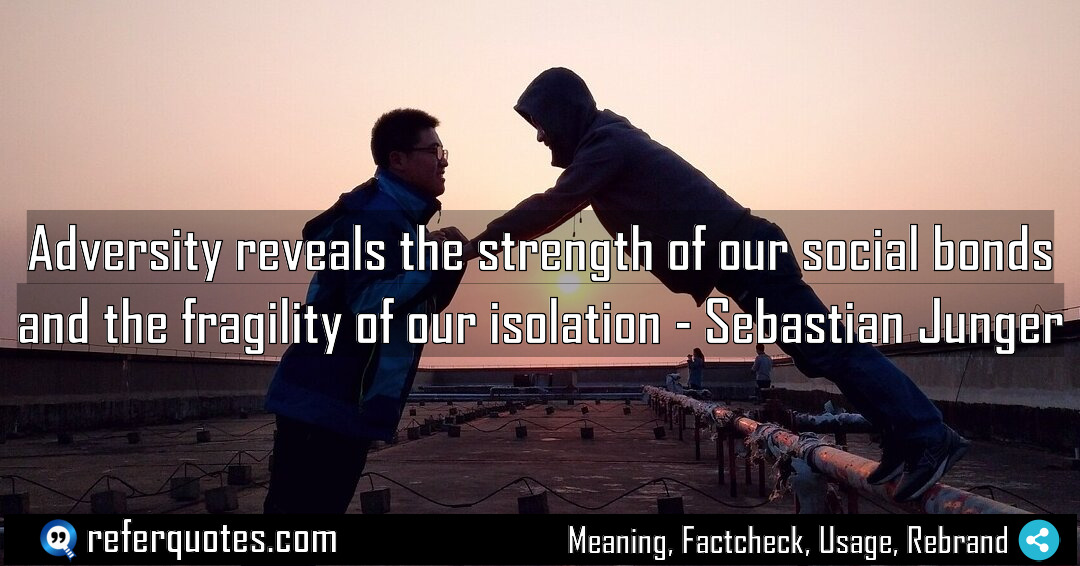Adversity reveals the strength of our social bonds is a powerful truth about human nature. It shows how crisis strips away superficial connections and forces us to rely on each other, exposing the profound weakness of going it alone.
Share Image Quote:Table of Contents
Meaning
At its core, this quote means that hard times don’t just test individuals; they test the very fabric of our communities. It’s a dual revelation: we see how strong our support systems truly are, and we simultaneously realize how utterly unsustainable and fragile a life of isolation really is.
Explanation
Let me break this down from my own observations. You see, in comfortable, modern life, we can afford the illusion of independence. We have our careers, our curated social media feeds, our solo apartments. It feels solid. But it’s a house of cards.
When a real crisis hits—a natural disaster, a community-wide problem, even a personal tragedy—that illusion shatters. Instantly. And what emerges? People start talking to their neighbors. They share resources. They offer a shoulder to cry on. The petty divisions of politics and social status just melt away because they’re irrelevant to survival and basic human comfort.
That’s the “strength of our social bonds” part. The “fragility of our isolation” is the flip side. It’s the stark, lonely realization that facing that storm entirely by yourself is not just difficult; it’s psychologically devastating. We are not built for it. The quote is essentially saying that our deepest strength was in each other all along, and adversity is just the brutal, honest teacher that forces us to see it.
Quote Summary
| Context | Attributes |
|---|---|
| Original Language | English (3668) |
| Category | Life (320) |
| Topics | adversity (4), isolation (8), strength (36) |
| Literary Style | philosophical (434), poetic (635) |
| Emotion / Mood | inspiring (392), reflective (382) |
| Overall Quote Score | 85 (305) |
Origin & Factcheck
This insight comes directly from Sebastian Junger’s 2016 book, Tribe: On Homecoming and Belonging. It’s a key thesis that runs through the entire work. You’ll sometimes see similar sentiments floating around the internet attributed vaguely to “Native American wisdom” or other sources, but this specific, eloquent phrasing is 100% Junger’s, born from his research and journalistic work in the US.
Attribution Summary
| Context | Attributes |
|---|---|
| Author | Sebastian Junger (60) |
| Source Type | Book (4032) |
| Source/Book Name | Tribe: On Homecoming and Belonging (60) |
| Origin Timeperiod | 21st Century (1892) |
| Original Language | English (3668) |
| Authenticity | Verified (4032) |
Author Bio
Sebastian Junger is born in Belmont, United States on 1962. He studied cultural anthropology at Wesleyan University and built his career in journalism. He is the one of the leading contributor and editor at Vanity Fair. Along with Tim Hetherington, he codirected Restrepo(2010 American documentary), which went on to win Sundance’s Grand Jury Prize and an Academy Award nomination. The Sebastian Junger book list includes The Perfect Storm, Tribe, A Death in Belmont, Freedom, War, and In My Time of Dying, each marked by distinct writing style
| Official Website
Where is this quotation located?
| Quotation | Adversity reveals the strength of our social bonds and the fragility of our isolation |
| Book Details | Publication Year: 2016; ISBN: 978-1-4555-6638-6; Last edition: 2017; Number of pages: 192. |
| Where is it? | Chapter 3: In Bitter Safety I Awake, Approximate page 83 from 2017 edition |
